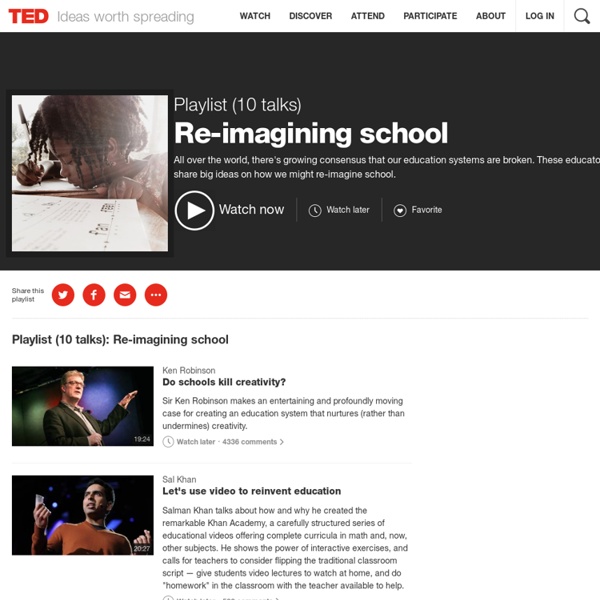



http://www.ted.com/playlists/24/re_imagining_school
Related: ted-es videókThe Future of Schooling: Are Students Being Prepared to “Dance with Robots”? February 21, 2014 by Paul W. Bennett One of the most stimulating recent ‘think pieces,’ Houman Harouni’s “What should a School be?‘ has set the cat among the pigeons in the North American education world. 10 Ways to Build Teacher Leaders “You don’t need to be in a leadership position, to be a leader.” By Jill Thompson We need teacher leaders! Day 7: A Future Space for Teachers to Share What did you learn today? Submitted by: Louise Robitaille On March 27th 2014, Pete Douglas and I were invited by the TLLP (Teacher Learning and Leardership Program) team to attend a focus group discussion with TVO.
Women Need To Brag More At Work Ah, the see-saw advice that women face when it comes to professional success. Can we have it all? Should we lean in? Why Do We Keep Creative People Out of Leadership Roles? 265Share Synopsis We love stories of creative leaders; we just don’t want to be led by them. We admire stories of creative leaders. We like to hear tales of CEOs and political leaders bringing about transformation with fresh ideas and innovative thinking. The Secret to Leadership Finding You You aren’t a leader if you don’t have followers. “He who thinks he leads, but has no followers, is only taking a walk.” John Maxwell, “The 21 Irrefutable Laws of Leadership“ 12 Words You Need to Delete From Your Resume Right Now Wise Bread Picks According to a recent study, recruiters spend an average of 6.2 seconds looking at an individual resume. Working with that kind of attention span and operating with limited space, resume writers need to make every word count. With this in mind, it might be time to a take a critical look at your resume or CV (or even your LinkedIn profile) and root out terms that aren't doing you any favors. And you can start with these 12 vague, cliche, inappropriate, or downright meaningless words. (See also: Get Your Resume Past the Resume Filter)
Literacy 2.0:Orchestrating the Media Collage At the epicenter of the evolving nature of literacy is digital literacy, the term du jour used to describe the skills, expectations, and perspectives involved in living in a technological society. How has digital literacy evolved in the 25 years since digital tools began appearing in classrooms? And how can we make it more responsive to our present needs? Writing What You Read 5 Ways To Influence Change “At the end of the day, what qualifies people to be called ‘leaders’ is their capacity to influence others to change their behavior in order to achieve important results.” Joseph Grenny In a time where the only constant in education is change, people involved with education need to become “change agents” more now than ever. You can understand pedagogy inside out, but if you are unable to define “why” someone should do something different in their practice, all of that knowledge can be ultimately wasted.
10 Job Interview Tips From A CEO Headhunter No two situations are ever exactly the same, but as a general guide, these are the types of questions that could come up in a typical interview. 1. Why don’t you tell me about yourself? This question, often the interview opener, has a crucial objective: to see how you handle yourself in unstructured situations. The recruiter wants to see how articulate you are, how confident you are, and generally what type of impression you would make on the people with whom you come into contact on the job.
9 Defining Ways Educators Can Tug Education Back in the Right Direction As I watched my field day team win one of the longest bouts of tug-of-war I’ve ever seen, I was reminded how forces combine to tug education in the wrong direction. It might be as subtle as a phrase or a bad habit permeating our profession. This morning as I sat down to blog, opinions and rants poured from my heart onto the page about the forces tugging us in the wrong direction. We can pull back – add your voice but even better – add your actions. Education is a noble calling – lets do things worthy of that calling.